Walter Cronkite up-close: Memories of the late, great journalist for all seasons
07/18/09 10:03 AM
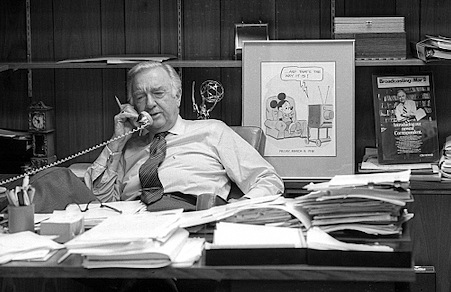
By ED BARK
Heavily outfitted with hearing aids, Walter Cronkite walked haltingly but gamely through a luncheon crowd in a downtown Dallas hotel.
He wore a blue blazer, grey slacks and an accommodating smile as an aide guided him toward the dais. My notes say it was March 2, 2006, the date of Cronkite's last public appearance in North Texas. He was 89 at the time and tired easily. But the storied TV newsman, who died Friday evening of complications from dementia, could still rouse himself for an easygoing 45-minute conversation with National Center for Policy Analysis president Pete du Pont, the former Republican governor of Delaware and 1988 presidential candidate.
Cronkite flashed a "Hook 'em Horns" sign when it was noted that he once studied journalism at the University of Texas before dropping out in 1935 to become a full-time reporter for The Houston Press. He joined United Press in 1937, and for a time was stationed in the wire service's Dallas bureau. His first big story as a reporter was that year's school explosion in New London, Texas. A total of 294 students and teachers were killed.
"It was really a ghastly scene," he recalled in the 1996 CBS special Cronkite Remembers.
At the Dallas luncheon, Cronkite took a crack at the then blossoming "blogosphere," which he did not look kindly upon.
"We're getting some pretty sloppy journalism from time to time," he said. "It is extraordinary, the blogging business. Of course, it makes for interesting reading, the kind of nut material that frequently is on there . . . It is not journalism per se. I think the blogosphere business will run itself out."
During his pre-Internet and largely pre-cable days as anchor of the CBS Evening News -- April 16, 1962 to March 6, 1981 -- Cronkite let his emotions overtake him just twice. He choked up when telling the nation that President John F. Kennedy had been assassinated in Dallas. And he was like a school kid -- "Oh boy!" -- on the day Neil Armstrong became the first man to walk on the moon.
Cronkite, a space buff through and through, told his Dallas audience that the July 20, 1969 moonwalk is the date the world will remember 500 years from now. His closing words at the luncheon appearance were otherworldly: "We escaped our environment on the earth and proved that man could live and work on the moon."
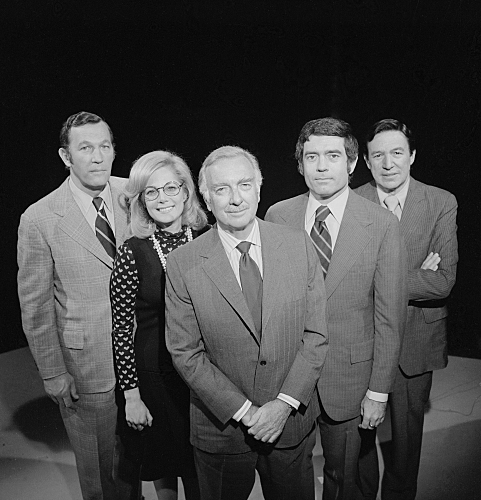
I was lucky enough to cover Cronkite, and many times converse with him, during my tenure as TV critic at The Dallas Morning News.
The first up-close meeting came in September, 1981 at the annual Radio-Television News Directors Association convention in New Orleans. Cronkite had stepped down just a half-year earlier as anchor of the Evening News, ceding the chair to Dan Rather lest CBS lose him to ABC News and its predatory president, Roone Arledge. His speech at the RTNDA gathering was tied to his acceptance of the organization's highest honor, the Paul White Award, named after a pathfinding CBS news director.
Cronkite, 65, had a steady drumbeat back then. He invariably bristled at reports he had quit the news business for a rocking chair.
"Besides the honor of the thing, the award gives me a platform from which to deny that unseemly publicity of last spring about my retirement," he said. "What retirement, for God's sakes?"
He indeed had been pretty busy, segueing from the Evening News anchor chair to hosting the science-themed Walter Cronkite's Universe series for CBS. "And now that fall has come, I am back on the job and, as we had planned from the beginning, looking forward to frequent contributions to the Evening News," he said.
But by February of 1982, Cronkite already felt he was working too hard and enjoying it less. In an expansive interview before a speaking engagement in Dallas, he spoke wistfully of spending more time on his sailboat.
"We'll see if we can't work out a more orderly plan of some kind that will give me a little more time off," he said. "But my problem is I'm an old firehorse and when they ask me to go, I go without any second question. I suppose these are idle dreams of spending more time on my boat and sailing around the world and all that stuff."
Meanwhile on the Evening News, Rather had taken to wearing sweaters. Coincidentally or not, the ratings warmed up, too. Cronkite tried to be diplomatic.
"I never thought of him as a sweater boy before," he said of his successor. "I'm surprised by all the publicity about it. I thought he had a cold. I don't mind the tinkering with the set if it doesn't get out of hand. I just hope we don't get into the business of having to walk onto the set from the shadows and have Dan wearing a big 'CBS Eye' patch on his blazer."
Cronkite was no stranger to artificial additives in his early days at CBS. In the mid-1950s he hosted the network's first early morning news effort, a live, three-hour program that co-starred Bill and Cora Baird's puppets. Cronkite regularly interacted with a stuffed lion named Charlemagne. He grew to hate the assignment, particularly the hours.
"After a very few months, it gets very old getting up at 2 o'clock in the morning," he recalled. "You never feel right. You're always kind of floating in a miasma of sleeplessness. The terrible thing is you're off work around noon. That's dinnertime for you and only lunchtime for everybody else. So after you've had about four martinis at lunch, you go stumbling unshaven through the gutters of Manhattan. And people say, 'Look at poor old Cronkite, he's gone to hell in this business.' "
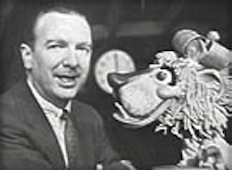
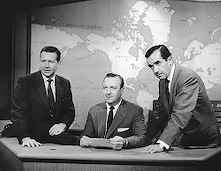
Cronkite's relationship with Rather seemed ever-problematic. Did Rather feel threatened by Cronkite's shadow and try to squeeze him out as both an Evening News and national political convention contributor? Had Cronkite ever really respected the man whose elevation sent him packing at age 65 while some 60 Minutes correspondents have endured into their 90s?
Cronkite publicly called for Rather's firing in 1987 after he caused a six-minute breath of dead air by walking off a CBS Evening News set in Miami when a tennis match was running long. He later had it both ways in a series of interviews tied to Rather's stepping down as anchor in March 2005 after the heavily publicized scandal tied to discredited reports on George W. Bush's Texas Air National Guard service.
"I certainly think he (Rather) should be remembered for his career successes," Cronkite told me in a telephone interview shortly before Bob Schieffer began an extended term as interim anchor of the Evening News. "We all know how unfortunate it is that his last days were sullied by this problem. But that will dim over time, I think."
But just a few days later, Cronkite told CNN that CBS had waited too long to replace Rather. Schieffer should have been brought in "a long time ago," he said. "It surprised quite a few people at CBS and elsewhere that without being able to pull up the ratings beyond third in a three-man field, that they tolerated his being there for so long."
Rather has never spoken ill of Cronkite -- at least not on the record. The two men made their most public attempt at reconciliation during the 1988 Democratic National Convention in Atlanta after Cronkite conceded they'd had a falling out.
A handful of reporters were invited to the CBS skybox for a little Rather-Cronkite show-and-tell after the network had largely excluded Cronkite from its 1984 convention coverage. But the session didn't go exactly as planned. The two of them were asked about other matters until just a few minutes before Cronkite had to leave to interview an undisclosed political heavyweight for the last night of CBS' convention coverage.
Rather, fully aware of the importance of Cronkite's imprimatur, broke off his remarks to remind the gathering, "Walter has to go if you want to talk about any other subject."
Duly noted. And Cronkite played ball.
"I tell you, with my right hand on my heart and my left hand on the Bible, that this has been a really happy experience for me," Cronkite said of teaming with Rather. "There is absolutely no problem with our relationship at all. Our relationship at this convention has just been superb. I hope it continues like this and I expect it will. There isn't any reason why it shouldn't."
"You know I hope it will," Rather rejoined before calling Cronkite a "master broadcaster."
Cronkite acknowledged, however, that "it would be terribly less than honest to say that we haven't had a communication problem in the last couple of years. That communication problem ended with our association at this convention." Except that it hadn't. And never really would.
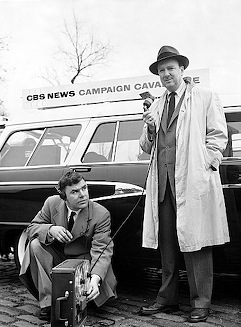
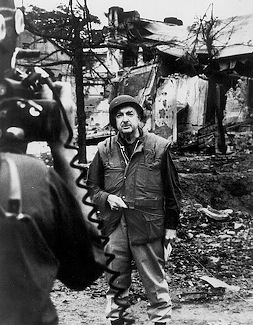
Their enthusiasm buoyed him. It was Dec. 5, 2000 at Southern Methodist University. And Cronkite, 84 and using a cane after a recent tennis injury, was holding forth at a packed student forum. More than 500 impressionable youths, many of them high schoolers, gave the old warhorse a standing ovation before one of them asked for his basic advice to would-be TV anchors and reporters.
"Go get a job," he said, grinning. And once you have one, "don't stoop to tawdry sensationalism or commercialism."
Cronkite took 16 questions from the audience, and afterward couldn't help but marvel at the reception he received.
"Yes, I think I was surprised," he said, chuckling. "I still am happily surprised that the young people today apparently look at some of our old footage and what we did in television in the early days. It's a privilege and an honor."
Cronkite also said he still yearned to be in the thick of it, intoning "And that's the way it is" to a new generation.
"Oh sure," he said. "I miss it every day a story breaks."
At the time it had been nearly 20 years since he vacated the Evening News while still able-bodied and energetic. And yes, he now had a somewhat different story. All that stuff about sailboating, taking more time off and charting new journalistic territories for himself -- well, he apparently didn't really mean it. The old job was what he wanted to keep all along.
"I regretted it the day after I walked out of the office," he said of yielding the CBS Evening News. "It wasn't a month later that a shot was taken at (President) Reagan. And here I was in Moscow all that time doing a documentary, for heaven's sake. I could have kicked myself."
One other grand adventure eluded him. If only it were still possible, "I'd like to walk out there on the moon," he told one of the high schoolers. It would have given him the optimum perspective on Earth, which Cronkite called "this little lifeboat floating out there in space."
Then he truly would have seen it all.
